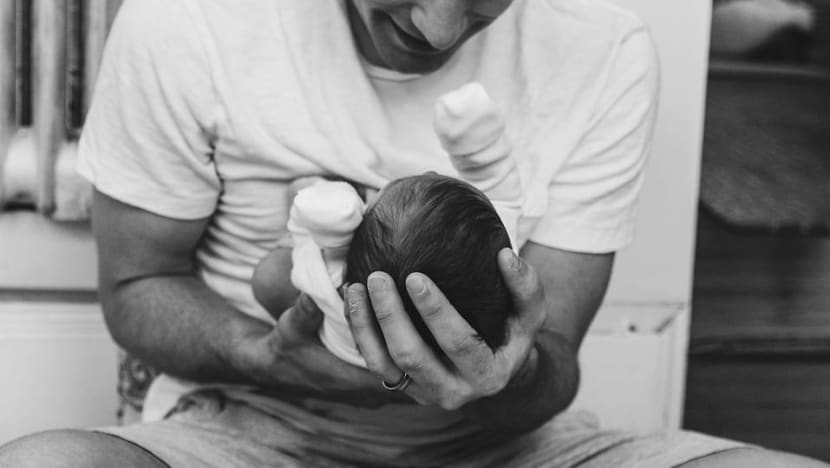Commentary: More paternity leave is promising, but Singapore could be so much bolder
Making the increased paternity leave mandatory, narrowing durational disparities with maternity leave and shaping workplace norms for to-be fathers are essential for shared parenting and healthy familial outcomes, say the Institute of Policy Studies’ Mathew Mathews and Melvin Tay.

SINGAPORE: Fathers of Singaporean children will from next year be able to take four weeks of government-paid paternity leave, doubled from the existing two weeks.
Deputy Prime Minister and Finance Minister Lawrence Wong announced on Tuesday (Feb 14) in his Budget 2023 speech that this will begin with employers having the option to voluntarily grant the additional leave, to be reimbursed by the Government.
Budget 2023 came with a plethora of financial support to help new parents, from the enhanced Baby Bonus Cash Gift to Child Development Account grants. While analysts agree that no one will be rushing home to make babies, taken in tandem, the measures could tip the scales for couples deciding to have children.
More paternity leave is a stride in the right direction, but there is scope for Singapore to be so much bolder.
PATERNITY LEAVE IN SINGAPORE CONTEXT
Fathers in Singapore have been warming up to paternity leave since it was introduced in 2013, then increased from one week to two weeks in 2017. Last year, more than half of new fathers consumed paternity leave; this is more than double the 25 per cent take-up rate a decade ago.
There are certainly benefits of paternity leave in the Singapore context, as a 2022 study published in the Journal of Marriage and Family attests. Led by Professor Jean Yeung and leveraging data from 2,662 households, the study found that longer durations of paternity leave not only increased the bonds between father and child, but also significantly reduced family conflict, increased marital satisfaction, and were associated with improved socio-emotional outcomes in early childhood.
Significantly, in households where new fathers took only one week as opposed to two weeks of paternity leave, the results were less ideal, with more instances of parental aggravation reported. This underscores the value of a longer paternity leave period.
There is reason to believe a four-week period could yield substantial additional benefits, given that positive outcomes were primarily driven by stronger couple relationships.
For one, it gives mothers some predictability that their partners will be at least physically present during stressful periods post-childbirth, when there is a risk of postnatal depression.
Longer paternity leave periods also signal the commitment of fathers to prioritise family over work for a substantial amount of time, building confidence for both parents that fathers can be relied upon for more intense caregiving responsibilities, should the need arise.
DON’T DELAY MAKING PATERNITY LEAVE MANDATORY
Mr Wong said that the Government intends to make the four-week paternity leave mandatory “in due course”. This should come sooner rather than later.
Ten years have passed since the scheme was first rolled out, with government-supported financial measures to offset employers' costs. Some multinational enterprises in Singapore already provide substantially longer paid paternity leave periods of up to four months - equitable with the 16 weeks of government-paid maternity leave for mothers.
For these companies, at least, it is clear that going above and beyond to provide their employees with such benefits is part of a robust strategy to attract and retain talent, and does not detract from their pursuit of the pecuniary.
DISPARITY BETWEEN PATERNITY AND MATERNITY LEAVE
While more paternity leave is valuable in encouraging fathers to be more involved in parenting, the durational disparity still entrenches the mother's role as the primary caregiver - even after there are no longer biological constraints such as in breastfeeding.
There is a recognition that if men do not share in domestic duties, women are likely to be reluctant about childbearing - the prospects of performing the "second shift" at home after a gruelling day of work can be daunting.
Asian societies such as South Korea and Japan, have implemented, or are looking to embark on generous paternity leave schemes as part of broader endeavours to increase total fertility rates and combat ageing populations.
South Korea is in the process of legislating the option of an 18-month period of paid paternity leave, alongside shortening working hours for parents responsible for childcare. Meanwhile, new fathers in Japan are already entitled to 12 months of paid leave.
Related:
Further efforts should be considered to narrow or even close the disparity between paternity and maternity leave to encourage active fathering and underscore the ideal of equally-shared parenting. One potential measure, for instance, is drawing paid parental leave from a shared pool of entitlements.
WORK CULTURE NEEDS TO CHANGE TOO
But more paternity leave provisions won’t be enough if fathers cannot take them up unabashedly.
The international reality has been that even with generous leave available, men are more hesitant to make full use of it due to subtle pressures in the workplace: Men are often expected to prioritise work, with women expected to take up the slack at home.
Smaller companies may appreciate being given more time to adjust, especially with the “existing economic conditions and manpower and operational challenges”, as Mr Wong put it.
But just as some employers only embraced workplace transformation when the COVID-19 pandemic forced them to, being clear that the four-week paternity leave will be made mandatory in the near term could accelerate shifts in work culture.
The enhanced paternity leave provisions should signal to businesses that this is the new norm: Modern fathers, just like mothers, want to be well-involved in caring for their children even while staying valuable employees.
The vision of a Singapore “Made for Families” and a strong social fabric needs the support of all of us, and that includes employers.
Mathew Mathews is Head of the Social Lab and Principal Research Fellow at the Institute of Policy Studies, National University of Singapore. Melvin Tay is a Research Associate at the same Institute. They are both fathers.
























